WHO and the Italian Agency for Development Cooperation seek to improve resilience of Somalia’s health system by enhancing essential health services for hospitals in under-served states
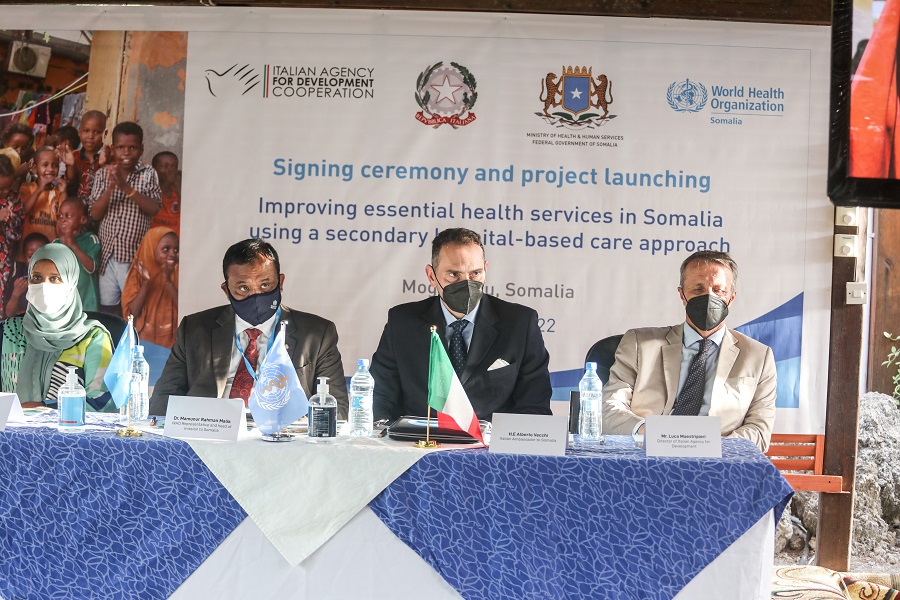 WHO Somalia/Khurram Sajjad.
WHO Somalia/Khurram Sajjad.
Mogadishu, 9 May 2022 – In their continued and collective efforts to improve health system resilience, the Ministry of Health and Human Services of the Federal Government of Somalia, World Health Organization (WHO) and the Embassy of Italy have joined forces and officially launched a €3 million multi-year project entitled ‘Improving essential health services in Somalia using a secondary hospital-based care approach.’
The project is designed to improve delivery of essential health services at the secondary level care in Somalia by focusing on building strong and resilient hospital-based care at Hudur General Hospital in South West state and Dhusamareb General Hospital in Galmudug state – both of which are currently unable to meet the health care demand and needs of populations within their respective catchment areas. Developed under the leadership of the Federal Ministry of Health, in close partnership with WHO and the Italian Agency for Development Cooperation (AICS), the project aims to achieve universal health coverage (UHC) through strengthening hospital-based care for integrated delivery of secondary and critical care services, as well as improving hospital management system for better stewardship and effective service delivery.
“We would like to express our sincere thanks to the Government of Italy for their very valuable support as they are a key donor supporting secondary care and hospital management in Somalia. This support will help Somalia to make strides in the provision of critical care for patients and strengthening of referral systems, as well as for improving the overall credibility of and trust in the public health facilities –a crucial goal for Somalia’s health system,” said HE Dr Fawziya Abikar Nur, Federal Minister of Health and Human Services.
“In 2019, only 27% of Somalia’s population had access to essential health services,” said Dr Mamunur Rahman Malik, WHO Representative and Head of Mission to Somalia. “Thanks to the support from the Government of Italy and AICS, with this project we will have the opportunity to change this narrative by offering crucial, life-saving services to more Somalis, particularly those who are vulnerable and live in remote locations. Moreover, the services offered are aligned to the revised essential package of health services for Somalia.”
“The project will contribute to the humanitarian-development-peace nexus (HDPN) in Somalia, by linking the short-term goal of improving secondary level care to the long-term development goal of the government-to improve essential health services. It will also foster peace and development among the communities being served by contributing to addressing the root causes of tension and marginalization, and increasing health equity,” said HE Alberto Vecchi, Ambassador of Italy to Somalia.
Over a 2-year period, among other things, this project will aim to: optimize basic primary care services; fill in existing gaps in the provision of specialized, secondary health care (e.g. emergency, critical, surgical care); offer referral services to at least 5 districts in each state; use solar power to deliver oxygen; refine waste management systems; ensure gender balance in capacity development and employment; improve hospital management and ownership by the local health authorities; and improve the capability of health personnel to better respond to emergencies. Overall, and in addition to being in line with the new Essential Package of Health Services (EPHS) 2020 for Somalia, this project will complement efforts towards achieving the target of UHC and ensuring health for all.
The official announcement follows a previous signing ceremony and a high-level commitment ceremony held on 21 April and 11 January 2022, respectively, in Mogadishu. During the latter, the Federal Ministry of Health, WHO, Embassy of Italy and Mr Luca Maestripieri, Director of AICS and Minister Plenipotentiary, Ministry of Foreign Affairs and International Cooperation, collectively agreed to work together in ‘Improving essential health services in Somalia using a secondary hospital-based care approach’ into the future across Somalia.
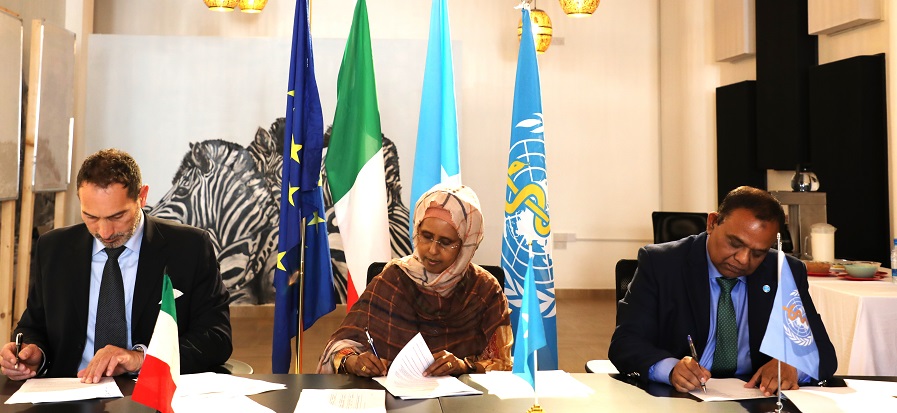 WHO Somalia/Khurram Sajjad.
WHO Somalia/Khurram Sajjad.
Note to editors
This new and vital multi-year project stems from a continued partnership established between WHO, the Embassy of Italy in Mogadishu and AICS Somalia, whereby a total of €1.4 million has been provided to WHO since 2019 to support emergency response activities, as well as mental health and psychosocial support services for vulnerable populations and victims of improvised explosive devices at Hudur General Hospital.
For additional information, please contact:
Khadar Hussein Mohamud, Head of Coordination and Communications, Ministry of Health, Federal Government of Somalia
Massimiliano Bertollo, Deputy Head of Mission, Embassy of Italy in Mogadishu
Santa Molè, Director, AICS Somalia <
Kyle DeFreitas, Lead – External Relations, WHO Somalia
Fouzia Bano, Communications Officer / Chief of Staff a.i., WHO Somalia
WHO Regional Director for the Eastern Mediterranean pays a visit to Somalia
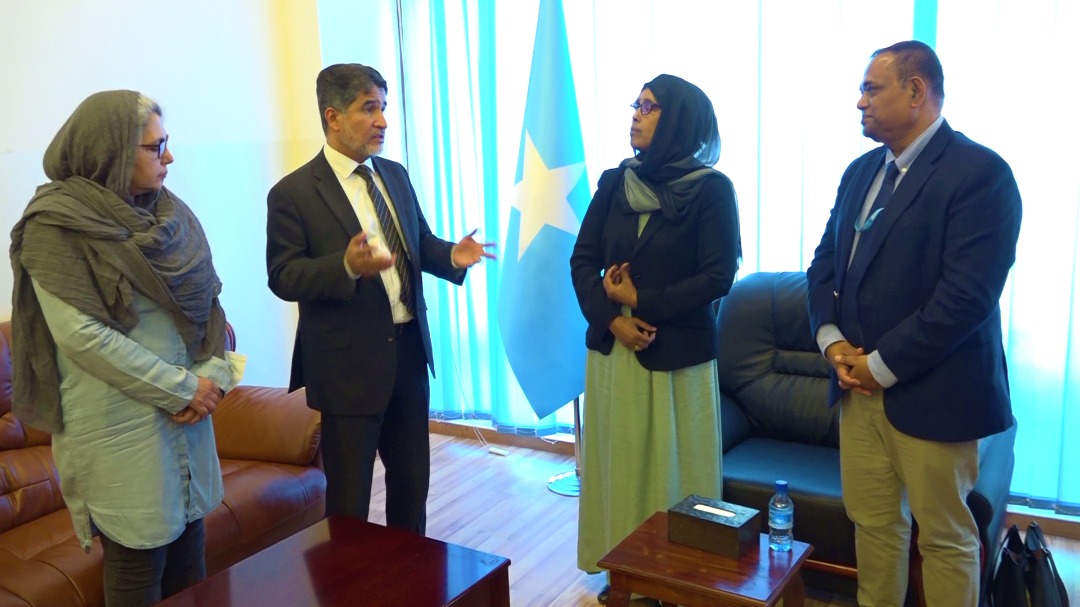 Director of Business and Operations Services of the WHO Regional Office for the Eastern Mediterranean Dr Sussan Bassiri, WHO Regional Director for the Eastern Mediterranean Dr Ahmed Al-Mandhari, Federal Minister of Health and Human Services HE Dr Fawziya Abikar Nur, and WHO Representative in Somalia Dr Mamunur Rahman Malik. WHO Somalia/Fouzia Bano
Director of Business and Operations Services of the WHO Regional Office for the Eastern Mediterranean Dr Sussan Bassiri, WHO Regional Director for the Eastern Mediterranean Dr Ahmed Al-Mandhari, Federal Minister of Health and Human Services HE Dr Fawziya Abikar Nur, and WHO Representative in Somalia Dr Mamunur Rahman Malik. WHO Somalia/Fouzia Bano
Mogadishu, 9 May 2022 – On 9 May 2022, the World Health Organization (WHO) Regional Director for the Eastern Mediterranean Dr Ahmed Al-Mandhari arrived in Somalia for a 3-day visit. He was accompanied by the Director of Business and Operations Services of the WHO Regional Office for the Eastern Mediterranean Dr Sussan Bassiri.
The Federal Minister of Health and Human Services HE Dr Fawziya Abikar Nur other high-level government officials and the WHO Representative to Somalia Dr Mamunur Rahman Malik extended a warm welcome to Dr Al-Mandhari, who is visiting Somalia for the second time since 2019. He is visiting Somalia at a time when the country is rolling out an Essential Package of Health Services (EPHS 2020). The development and implementation of the EPHS 2020 is seen as the largest public sector project in the history of Somalia that aims to increase access to health care, improve health services delivery and coverage using the primary health care approach. WHO has supported the development of the EPHS 2020 of Somalia through a broad range of technical support involving its Regional Office and headquarters, which includes a burden of disease analysis costing, as well as design of cost-effective but high-impact interventions to be delivered at different levels of care. The EPHS 2020 will be financed by the World Bank and the Global Financing Facility over the next 5 years over a budget outlay of US$ 100 million. The EPHS 2020 will be the main driver of the country to achieve universal health coverage.
The WHO country office will continue to support the Ministry of Health and Human Services of the Federal Government of Somalia to roll out the EPHS in the country, as well as the delivery of other impactful interventions to protect health, save lives and build a resilient health systems through its recently developed "Country Cooperation Strategy for WHO and Somalia 2021–2025".
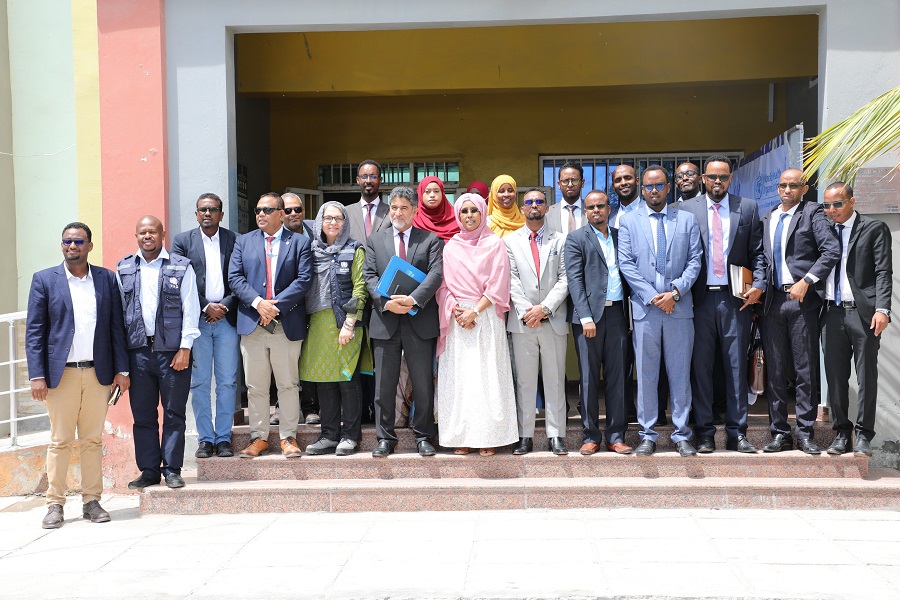 WHO Somalia/Fouzia Bano
WHO Somalia/Fouzia Bano
As part of his programme, Dr Ahmed Al-Mandhari met HE Dr Fawziya Abikar Nur and other officials of the ministry at her office on 9 May 2022 and discussed the ongoing collaborative programme between her ministry and the WHO country office. The WHO Regional Director thanked the Minister for her leadership over the past 5 years and expressed appreciation of her key role in guiding health sector reforms in the country and working relentlessly to improve the health and well-being of the population in a most challenging, complex and fragile context. The WHO Regional Director recalled that these reforms that she initiated for the health sector will go a long way in achieving universal health coverage and support implementation of WHO's regional Vision 2023: Health for all by all.
The WHO Regional Director also visited the De Martino Hospital in Mogadishu – the main public hospital that serves the capital city of the country and was the main hospital in the country treating COVID-19 patients. The WHO Regional Director lauded the health workers for their hard work in saving lives with limited resources and in the face of multiple challenges.
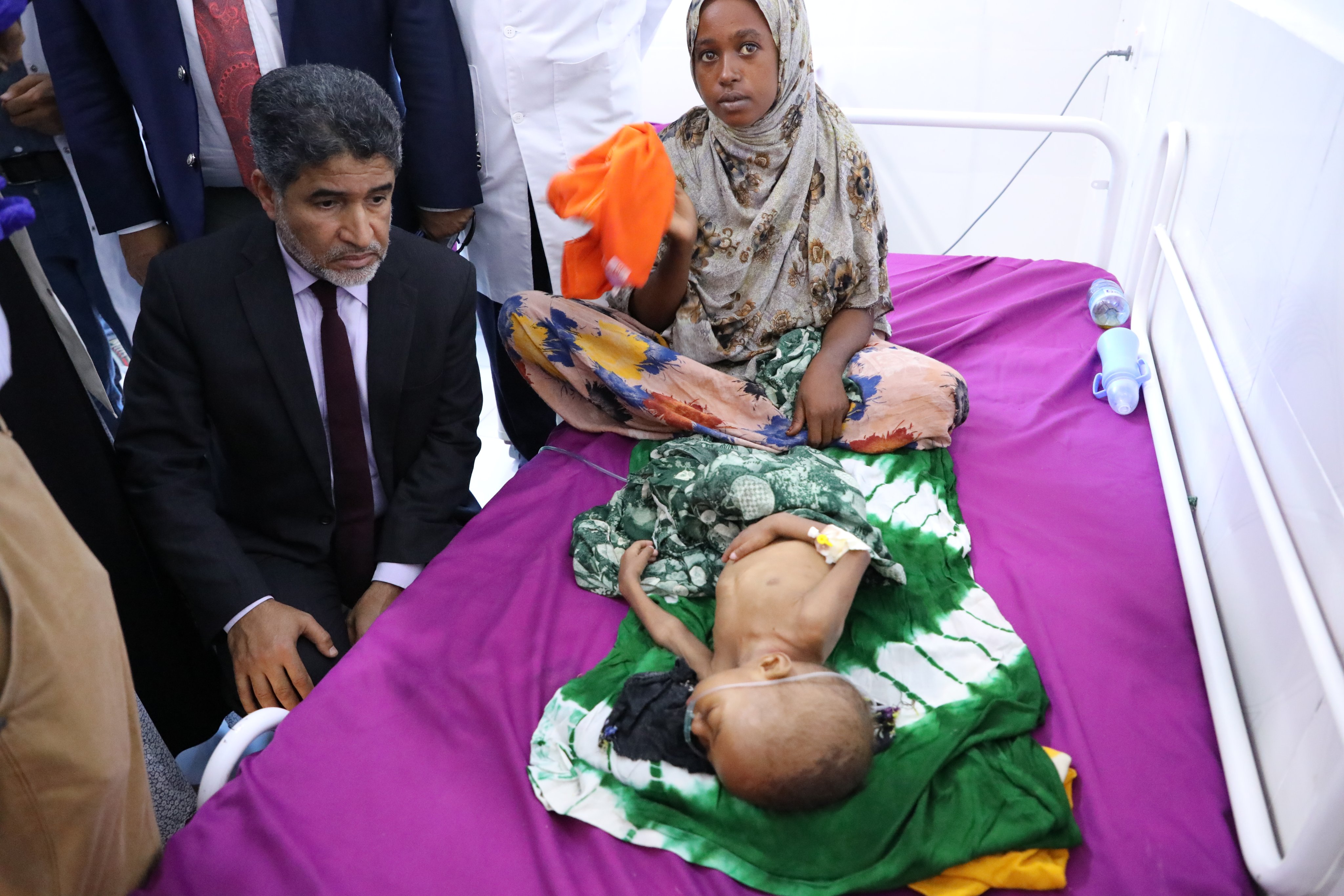 WHO Somalia/Fouzia Bano
WHO Somalia/Fouzia Bano
While addressing the health workers, Dr Al-Mandhari further reiterated that in line with the spirit of Vision 2023 “Health for all by all”, WHO would continue to support Somalia to strengthen the health system, infrastructure and health care workers’ skills, while concurrently preparing for and responding to any health emergencies that may arise.
Later on, Dr Ahmed Al-Mandhari accompanied by HE Dr Fawziya Abikar Nur and other high-level government officials, visited 2 landmark achievements stemming from WHO's COVID-19 response activities. First, they visited the new Pressure Swing Adsorption (PSA) oxygen plant that was installed at the De Martino Hospital with support from WHO, which is helping to fill a large gap in high-grade medical oxygen availability in the country for COVID-19 and other health conditions. The containerized duplex PSA system is serving 25 intensive care unit beds while concurrently refilling 100 40-litre oxygen cylinders per day. WHO plans to set up similar containerized duplex PSA plants in several other locations as part of the Organization’s vision to bridge medical oxygen access gaps in hospitals and primary level care.
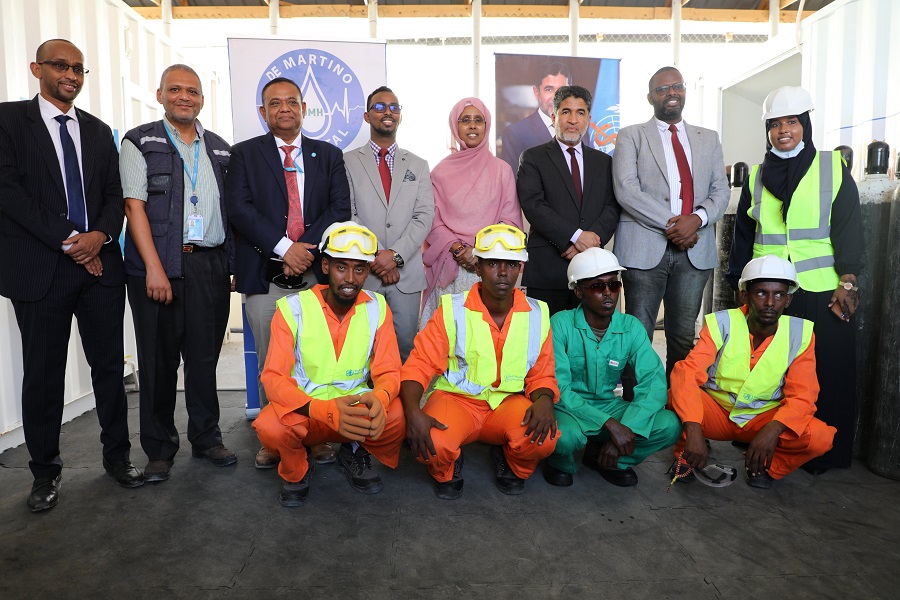 WHO Somalia/Fouzia Bano
WHO Somalia/Fouzia Bano
After viewing the PSA plant, the Minister and Dr Ahmed Al-Mandhari paid a visit to the National Public Health Reference Laboratory (NPHRL) in Mogadishu, where the Regional Director saw just how far Somalia had come with respect to laboratory testing and the newly developed capacity for genome sequencing. The NPHRL was supported by WHO in 2020 at the beginning of the COVID-19 pandemic to attain molecular diagnostic capacity for testing of SARS-COV-2 when there was no testing facility for COVID-19 in the country. The NPHRL using rt-PCR is now able to test and detect COVID-19, as well as other epidemic and pandemic-prone pathogens in real-time In March 2022, WHO supported the NPHRL to build genome sequencing capacity that will help the country to detect and monitor circulation of new variants of COVID-19, influenza viruses, map genomes of other bacteria and viruses of epidemic and pandemic potential.
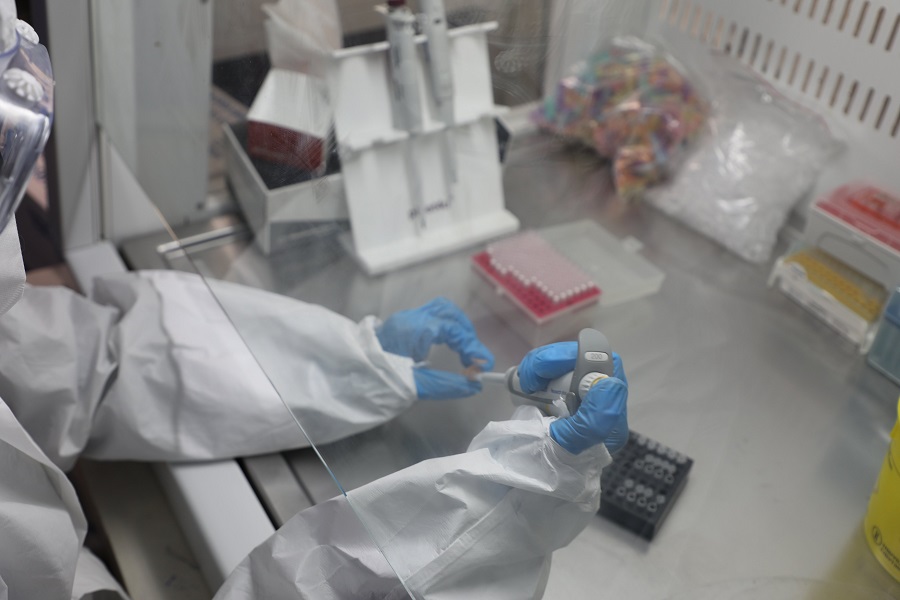 WHO Somalia/Fouzia Bano
WHO Somalia/Fouzia Bano
“Our Regional Director’s second visit to Somalia is an honour for the WHO Somalia country office and for the country. It shows WHO’s commitment to Somalia in responding to emergencies, while re-establishing resilient health systems that can cope with the impact of calamities, as well as any future emergencies. WHO will continue to develop strong foundations in health across the country and strive to build a fairer and equitable health system that serves all and not just a few," said Dr Mamunur Rahman Malik, WHO Representative to Somalia.
For additional information, please contact:
Kyle DeFreitas, Lead – External Relations, WHO Somalia <
Fouzia Bano, Communications Officer / Chief of Staff a.i., WHO Somalia <
Note to editors
Please see the link below for additional information on the WHO Regional Director’s last mission to Somalia, in September 2019, where Dr Ahmed Al-Mandhari launched the country’s roadmap to universal health coverage, together with the Federal Minister of Health and Human Services and WHO Representative to Somalia.
‘No fly zone’ for mosquitoes: controlling malaria in Somalia
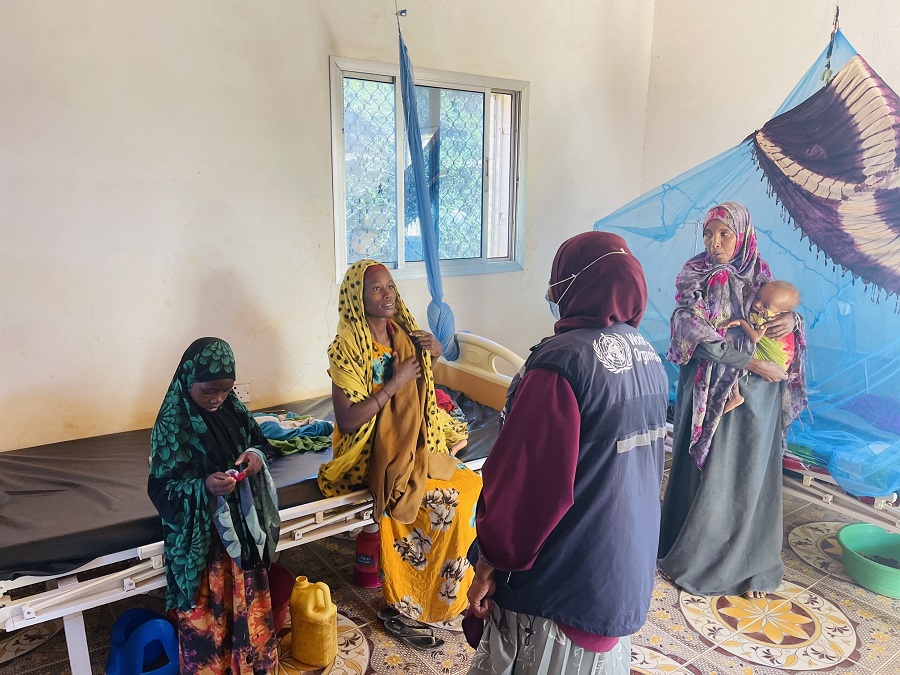 In Somalia, long-lasting insecticidal mosquito nets are one measure used to keep mosquitoes away. Credit: WHO/Somalia
In Somalia, long-lasting insecticidal mosquito nets are one measure used to keep mosquitoes away. Credit: WHO/Somalia
24 April 2022 – On 25 April 2022, World Malaria Day will be commemorated under the theme “Harness innovation to reduce the malaria disease burden and save lives.” Recognizing that the world needs a suite of approaches and tools to reduce the prevalence of malaria, WHO is calling for investments and innovation that bring new vector control approaches, diagnostics, antimalarial medicines and other tools to speed the pace of progress against malaria.
Prevalence in Somalia
In Somalia, malaria is endemic across the country, particularly in the south and central parts of the country. In 2021, the country confirmed 8101 malaria cases and 2 related deaths, which was a remarkable reduction compared to 31 021, 22 665 and 27 333, in 2018, 2019 and 2020, respectively, owing to the impact of the malaria control programme supported by WHO in the country.
The national malaria programme in Somalia did not observe any significant negative impact on malaria activities in 2020 due to the COVID-19 pandemic – the programme ran 253 172, 217 206, 337 965 and 295 475 malaria tests in 2018, 2019, 2020 and 2021, respectively. Despite this, joint urgent action is required to meet the 2030 targets outlined in the WHO global malaria strategy.
Malaria control
The malaria control programme in Somalia relies on early testing and identification of cases, effective case management using the right anti-malarial drugs, and distribution of insecticide-treated bed nets and indoor residual spraying (IRS) for preventing mosquito bites.
In Bossaso, 52-year-old Sahra Yusuf Ali, had a headache, fever, vomiting and joint pain. On visiting a local health facility, she was diagnosed with malaria after she took a rapid diagnostic test.
Sahra expressed her gratitude to the Ministry of Health, UNICEF and WHO, and the Global Fund to Fight AIDS, Tuberculosis and Malaria (GFATM) for their support to health facilities. It was thanks to their support that Sahra could get tested and treated with antimalarial drugs. After her experience, Sahra requests Somali communities to clean all sources of mosquitoes, use insecticide-treated nets and get tested as soon as they have symptoms of malaria, to avoid complications.
Acknowledging the support that partners have lent malaria reduction efforts, Dr Mamunur Malik, WHO Representative said, “We would like to thank the federal and state governments of Somalia, UNICEF, the GFATM and other partners for their collaboration in controlling and eliminating malaria. In line with the theme for World Malaria Day this year though, we collectively need to think critically about how to use innovative approaches and tools to test for malaria and prevent any additional cases of malaria.”
The Federal Government of Somalia, in collaboration with WHO Somalia and partners, have developed ‘Guidelines for the Diagnoses and Treatment of Malaria in the Somali Context 2016’ to help health personnel manage malaria cases and identify symptoms in a timely manner. They have also introduced malaria elimination activities in targeted districts.
 WHO works with the government and partners to strengthen the skills of health workers, to improve surveillance for and management of malaria cases. Credit: WHO/Somalia
WHO works with the government and partners to strengthen the skills of health workers, to improve surveillance for and management of malaria cases. Credit: WHO/Somalia
Modifying berkits to reduce larva in Bossaso
In 2017, the national malaria control programme conducted an assessment to determine the main factors contributing to the malaria burden in Somalia. This assessment found that manmade berkits or well-like containers used to store water, made of mud or cement, accounted for 89% of breeding sites for mosquitoes.
Additionally, the malaria control programmes in Puntland and Somaliland found that the Anopheles stephensi vector found in Bossaso in 2019 and in Berbera and Hargeisa in 2020 were breeding in the berkits, which shows the malaria burden in Somalia has been magnified due to this method of water storage.
As next steps, in January 2021, the national malaria control programme, with support from WHO and funding from GFATM through UNICEF, implemented a pilot project as a larval source management effort, to modify 200 berkits in Bossaso, which are ubiquitous due to the limited piped water supply in the city. The programme covered the sides of the containers permanently to shield stagnant water from mosquitoes.
After 12 months of the project, between December 2021 and January 2022, an assessment was conducted in 132 households in two locations in Bossaso city, one where berkits had been modified, and another where no modifications were made. A screening conducted in both districts noted a four-fold reduction in malaria positivity rate in the district where berkits had been modified to keep mosquitoes out.
Noting this success, this assessment recommended that this larval source management intervention should be extended to other villages and cities affected by malaria.
World Immunization Week 2022: immunization efforts need a shot in the arm say Somalia’s Government and UN
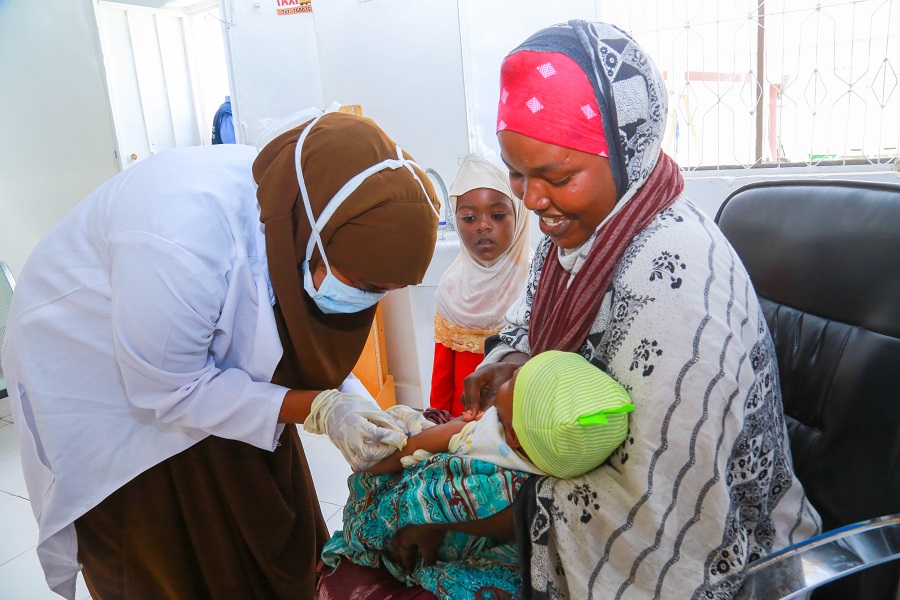 WHO supported the federal and state governments to resume routine childhood vaccinations during the COVID-19 outbreak in Somalia. Credit: WHO/Somalia
WHO supported the federal and state governments to resume routine childhood vaccinations during the COVID-19 outbreak in Somalia. Credit: WHO/Somalia
23 April 2022, Mogadishu – While marking World Immunization Week this year, Somalia’s Federal Ministry of Health and Human Services, the World Health Organization (WHO) and the United Nations Children’s Fund (UNICEF) jointly urged humanitarian partners, local private agencies and donors to help boost immunization efforts and outreach across Somalia. This message is in line with the theme for World Immunization Week, 2022, running from 24 to 30 April, which is ‘Long life for all – in pursuit of a long life well lived.’
World Immunization Week 2022 aims to spur greater engagement around immunization globally, to reiterate the importance of vaccination and improve the health and well-being of everyone, everywhere.
In line with this global call and taking into account only 9% of Somalis have been fully vaccinated against COVID-19, Dr Fawziya Abikar Nur, Minister of Health, the Federal Government of Somalia said, “In 2020, the world witnessed a pause on many health services due to the COVID-19 pandemic. By producing vaccines at record speed, alongside other measures, we have now seen how life is resuming slowly again. However, in developing countries, such as Somalia, the majority of the population still remains to be vaccinated. They are still at risk, and we cannot emphasize enough – we must reach everyone, wherever they live, to stop diseases such as COVID-19 from mutating and circulating.”
“Vaccines are one of the greatest success stories of public health. And yet, with all the knowledge and tools we have, Somali children are still contracting vaccine-preventable diseases, and adults are still being infected with diseases such as COVID-19. It is our moral imperative to ensure every Somali has equitable access to vaccinations and a life free of disease and disabilities. We must all join forces to reach more people with life-saving vaccines,” said Dr Mamunur Rahman Malik, WHO Somalia Representative and Head of Mission, while describing how the advent of smallpox vaccines showed the world that it is possible to eradicate diseases if governments and all stakeholders join forces.
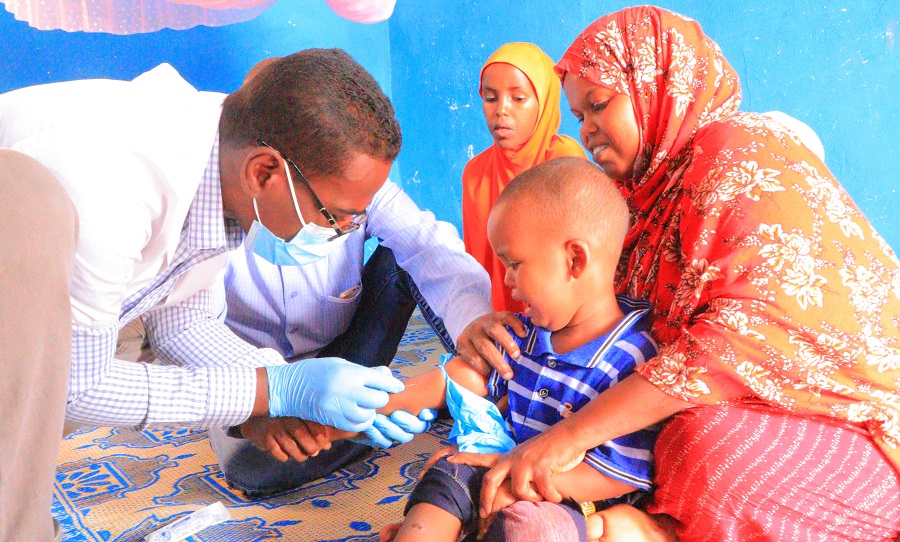 A child from an internally displaced camp receiving measles vaccines during a measles outbreak investigation, Garowe, Puntland. Credit: WHO/Somalia
A child from an internally displaced camp receiving measles vaccines during a measles outbreak investigation, Garowe, Puntland. Credit: WHO/Somalia
“It’s vital that parents and caregivers take control of their children’s health by making sure every child gets their routine vaccinations,” said UNICEF Representative a.i., Angela Kearney. “Vaccines ensure protection against preventable diseases and a healthier life. Vaccines are free and it’s the right thing to do.”
Somalia has an estimated 639 000 children aged under one year, but many are not able to access their regular childhood vaccinations. In 2021, 510 951 children received the third dose of penta vaccines to protect them from pertussis, diphtheria, hepatitis B, tetanus and Haemophilus influenzae type b, while around 80% of all measles cases confirmed in 2021 were children aged under 5.
Some of the challenges Somalia faces in ensuring all communities have access to vaccinations include a fragile health system, further impeded by conflict and natural disasters, including the ongoing drought, limited access to cold chain facilities in remote areas and among hard-to-reach populations, and difficulty in reaching people living in insecure and inaccessible locations.
 A medical expert visits a household in Jubaland to assess a measles outbreak and offer vaccines to children. Credit: WHO/Somalia
A medical expert visits a household in Jubaland to assess a measles outbreak and offer vaccines to children. Credit: WHO/Somalia
Over the years, WHO, UNICEF, and partners and donors have extended support to Somalia in developing mechanisms to store various vaccines and establish community vaccination programmes that resulted in vaccinating communities. Despite all the challenges, Somalia has indeed had some success in getting more children and adults, particularly vulnerable ones, vaccinated against vaccine-preventable diseases such as measles, cholera, polio, diphtheria, tuberculosis, pertussis, tetanus, Pneumococcal conjugate vaccine (PCV) and COVID-19 disease, using strategies such as mobile outreach sessions in addition to fixed vaccination sites. Additionally, teams of health care workers and social mobilizers, supported by the Government, WHO and UNICEF, are regularly visiting communities to share messages on the benefits of vaccination with them.
However, the country needs more support to protect children and adults, particularly vulnerable ones, from vaccine-preventable diseases.
For additional information, please contact:
Khadar Hussein Mohamud, Head of Coordination and Communications, Ministry of Health, Federal Government of Somalia,
Mukhtar Abdi Shube, Head of the Expanded Programme on Immunization (EPI) section, Ministry of Health, Federal Government of Somalia,
Fouzia Bano, Communications Officer, WHO Somalia,
Victor Chinyama, Chief of Communications, UNICEF Somalia,


